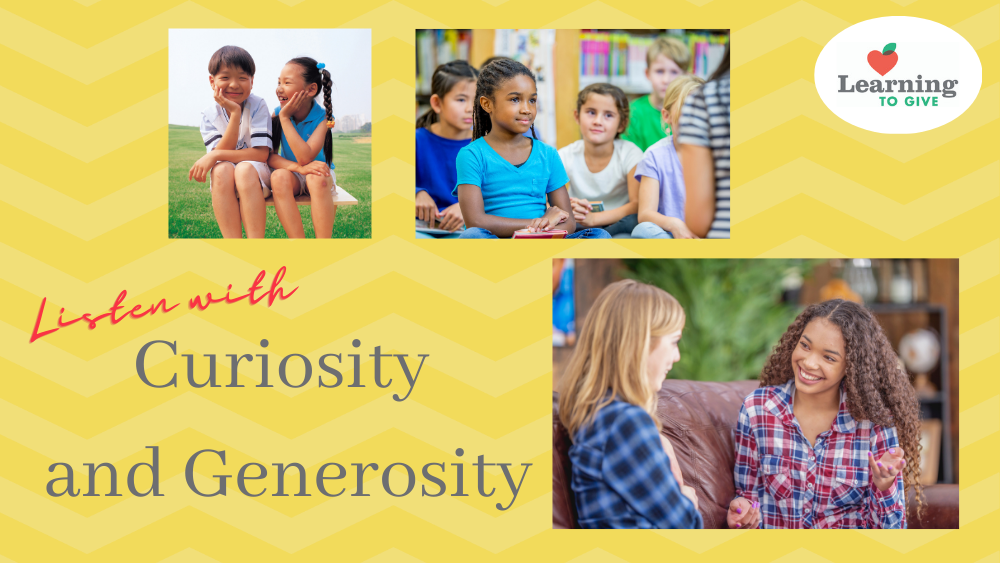Establishing a Culture of Listening and Curiosity
What do you miss about being together in class? In your youth group? In professional collaboration?
Go ahead, I'm listening.
I hear you. I feel it too. What was it like for you when you could do that? What will that thing you miss be like when we are back together safely?
This question and follow-up listening carry no judgment, no fixing, no proposed solutions or saying "it will be alright." This is listening with empathy and curiosity. This is what it is like to listen with generosity. Listening is step one in healing, and it is a norm of a classroom culture or organizational culture that values each person's role and importance to the whole. A culture that includes generous listening, empathy, and curiosity promotes social emotional health and leads to empowerment of learning and problem-solving.
What is culture and why is it important?
Your group, family, or classroom already has a culture established by norms and attitudes. It isn't a "nice thing to have;" culture already exists and influences how we see our work and relationships. Business people say “culture eats strategy for breakfast” because they know that good plans are carried or destroyed by the culture that is already present. The culture of an organization or family carries work, energy, and relationships like a current, whether we are aware or not. The good news is we can intentionally cultivate a positive culture. What you value and how you expect people to treat one another determines the culture.
Why do we need to build a positive culture?
We can find blame for why things aren't going well: the kids aren't trying; the pandemic keeps us apart; I'm tired. These are all true. Culture acts like a wave that carries either a defeated attitude or an "I can do hard things" attitude. Anyone in the group can influence the culture. The past year has brought change, uncertainty, loss, division, and isolation. As we enter a new year, we have hope for in-person meetings and more social and emotional supports. We are all hurting in some way and in need of healing. The first step in healing is … LISTENING.
Listening is an act of giving.
Listening is best with curiosity and generosity at its heart.
Watch this clip from the movie Inside-Out. You’ll see the problem begins to resolve when Sadness listens. Sadness was curious about what Bing Bong experienced and listened without judgment.
This clip from the movie Inside Out demonstrates two ways to respond to pain. Compare the techniques and outcomes between Joy, who is full of good intentions but centered on her own needs, and Sadness, who demonstrates simple empathy and curiosity.
When you reflect with youth on the video clip, ask the following questions:
- What did you notice?
- What do you wonder?
- How is listening in this situation an act of generosity?
"One of the most sincere forms of respect is actually listening to what another has to say." - Bryant McGill
Listening is an act of generosity because it involves empathy and a desire to give your attention and kindness to someone. Sometimes when we see someone in pain, our first instinct is to fix or distract, like Joy did in the movie clip. Her response was more centered on Joy's own needs. A culture that promotes generous listening, empathy, and curiosity promotes social emotional health and leads to empowerment of learning and problem-solving. To build this culture, directly teach listening skills and practice with discussion, games, protocols, and activities. Here are some suggestions:
- Discussion: Give age-appropriate topics and have young people practice eye contact, full attention, and repeating back what they heard.
- Games: Play the telephone game, sharing a brief verbal message from person to person. See if you can keep it consistent from beginning to end.
- Protocols: Person one talks for 2 minutes while person two listens silently; person two tells what they heard for 1 minute while person one is silent; person one clarifies for 1 minute.
- Activity: The activity Back-to-Back Builder uses listening and communication skills to build duplicate structures.
- Simple Safe Service project: Listening with Generosity guides a discussion about finding common ground related to big ideas.
Having conversations that focus attention on listening skills raises self-awareness and builds social-emotional expertise. When people repeatedly listen with empathy and curiosity, they are building a culture of connection and caring. Everyone wants to be heard and feel valued in their family, group, and community. The experiences of listening and being heard expand understanding of how we fit in community. It increases our ability to figure out what the community means ot us and what we can do to impact the community. When this practice is part of our community culture, we build lifelong skills in healthy relationships and generosity.
"Generous listening is powered by curiosity, a virtue we can invite and nurture in ourselves to render it instinctive. It involves a kind of vulnerability - a willingness to be surprised, to let go of assumptions and take in ambiguity. The listener wants to understand the humanity behind the words of the other, and patiently summons one's own best self and one's own best words and questions." - Krista Tippett
